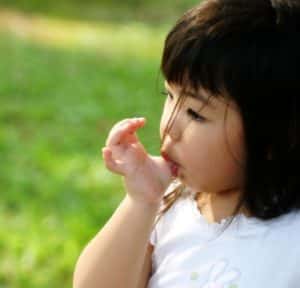Does Your Toddler Seem To Have A Thumb or Pacifier Permanently Stuck In Her Mouth?
Babies nearly all love their pacifier or their thumb – or both! The sucking reflex itself is instinctive. Babies would quickly starve and perish if they didn’t possess this strong instinct. Will thumb sucking affect my child’s teeth?
Via ultrasound, babies have been observed sucking their thumb at about 28 weeks in utero. Thumb sucking is believed to be a way for babies to self-soothe when a stressor occurs.
Just try to pry that beloved pacifier or thumb out of the mouth of a toddler! Screaming, sobbing, begging, terror and mayhem may ensue. If you think taking that baby blanket to the washer is hard, just wait until you go for the pacifier!
It is estimated that nearly 80% of babies and toddlers suck their thumbs. Unlike pacifiers, the thumb is a convenient ‘tool’ that is always available. Many babies learn to go to sleep by themselves with the assistance of a comforting thumb.
Sucking (thumb or pacifier) makes your baby’s brain produce endorphins, which calm her and give her a pleasurable feeling of satisfaction. There is a measurable change in body chemistry when a child sucks her thumb or pacifier.
Should you worry about these habits?
Until around age 3 or so, thumb sucking and pacifier use is really not an issue. In fact, we don’t recommend actively trying to get a child to stop a habit until age 3 or later, as they won’t have the capacity to understand why. If your child is too young, nothing you or your child’s dentist does will make a difference. The problems these habits create can begin if the habit continues too long, especially past the toddler years.
Most babies lose interest in thumb sucking or their pacifier before their first birthday, and often spontaneously stop as they begin to be consumed with learning about the world around them. If your child is still sucking her thumb or wanting her pacifier by age three, it may be time to talk with your Pediatric Dentist.
Here are some of the issues of prolonged thumb sucking or pacifier use past toddlerhood :
· The teeth may begin to protrude toward your baby’s upper lip, possibly creating a need for orthodontia later on.
· Your child’s bite may be affected, causing issues with chewing and/or speech.
· Sometimes, the jaw structure itself can be compromised, including all bones that support the teeth.
How can you help your child stop sucking her thumb or begging for the pacifier?
First, don’t make it into a big issue. This can cause stress, which sometimes makes the habit worse. Peer pressure in pre-school or Kindergarten can work wonders. No one wants to be thought of as a ‘baby’ when they are going to school! Here are some additional tips you might find helpful:

- Put gloves or socks on your child’s hands before bed as a ‘reminder’.
- A bandage on the favorite thumb can feel and taste strange – and is not so pleasant.
- Use positive reinforcement. Instead of saying ‘Don’t suck your thumb’, praise your child when she is not indulging in the habit. ‘What a big girl you are now!’
- Offer your child a substitute for calming or soothing, such as a fuzzy stuffed toy or favorite blanket.
- If the habit went away, only to reappear weeks or months later, consider that your child may be feeling unusually anxious. Finding out why can help alleviate the issue.
- A bitter-tasting nail polish, such as Mavala Stop, can help remind your child not to suck her thumb.
- One parent of a toddler who seemed as if he would still be using his pacifier in college decided to throw a ‘big boy party’ for him, in which he was celebrated as being no longer a ‘baby’ who needed a pacifier. It worked very well, they reported.
- Some parents invent the ‘binky fairy’, having the child leave it under the pillow whereupon it is magically exchanged for a gift.
- Another suggestion by a wise parent was to tell the child that the pacifier is needed by babies, and have her help wrap it up in beautiful paper to ‘give to a baby who needs it’.
- Put pacifiers in a bag and ‘exchange’ them for a toy at the toy store.
- Make sure your child’s babysitter or day care provider knows what you are trying to accomplish so everyone is working toward the same goal.
- Don’t stress too much about it – there are very few thumb sucking teenagers!
- Your Pediatric Dentist can create a mouth guard for those children who are having a really difficult time stopping the habit.
Understand that your Pediatric Dentist is your partner in creating your child’s healthy habits – consult with her during your child’s exams about thumb sucking and other habits. Will thumb sucking affect my child’s teeth? Yes, but we can help you minimize the affects. You’ll be relieved to know your issue is not unique and your child’s Pediatric Dentist has helped parents just like you solve this and other habits which can be detrimental to oral health.
Would you like more information about thumb sucking, pacifiers and other habits?
Click here for a great chart to help your child monitor their success in breaking the habit.













